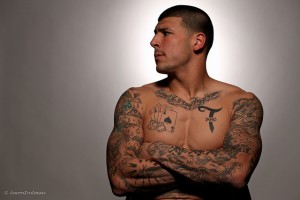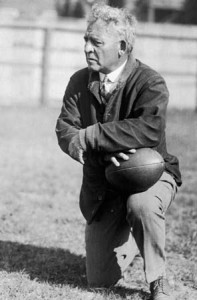In the wake of the Aaron Hernandez murder case, I have a lot of questions. That need answers. Such as 1.) Why have the New England Patriots continued to sign/draft malcontents and players with character issues? 2.) Why didn’t they do a better job vetting Aaron Hernandez? Or did they see the warning signs and just ignore them? 3.) What does The Patriot Way really mean today? Hasn’t the idea and the team brand been irreparably tarnished?
4.) What about Urban Meyer at Florida- why didn’t he do a better job molding Aaron Hernandez? Why did Meyer enable so much crime at Florida?
5.) Finally, what can the Patriots do moving forward with their players so that this doesn’t happen again? To help sort this all out, I enlisted the help of John Greenburg- Sports Historian and Author of “The Grand Old Man: Amos Alonzo Stagg”
Fitting, as I graduated from Amos Alonzo Stagg high school!
Here’s a lot of food for thought. John Greenburg answers my questions as follows:
The answer to question number one is:
The Patriots are a professional football team and from the very beginning of pro football, it has always been about making as much money as possible and/or win at all cost. Back in the day, pro teams would hire college and even high school players to play on Sunday under a phony name after playing on Friday or Saturday for their school. It all gets down to risk versus reward. It’s similar to the old days of Hollywood, when the studios ran the industry. More and more, players are treated like pieces of meat and problems are ignored as long as the owners make big money. The typical NFL career is less than three years, and then they’re on the scrap heap, and most likely with a lifetime of health issues.
Question number two:
In Aaron Hernandez’ case, we are talking about a person who is allegedly what could be called a psychopath/sociopath. He could have a predatory personality, and such people can be manipulative and able to mask their true personalities well. He apparently chose to lead a secret life. Bob Kraft reportedly claimed that he was duped by Aaron Hernandez. There are personality types that pro football management has little or no experience with. I was very fortunate to have known Bill Walsh, who at one point coached O.J. Simpson and later Hollywood Henderson, who publicly admitted his substance abuse issues. Walsh said at the time he was working with Henderson, he and his staff had very little knowledge of drug addiction. Criminal psychology has never been considered part of operating a football program That could possibly change.
I don’t believe that the Patriot “brand” has been irreparably harmed. We are talking about one player acting during his personal time, plus the story broke during the of- season. The Patriots’ damage control happened quickly. If the Pats go to the playoffs and win another Super Bowl, the issue will be largely forgotten. Winning usually heals many wounds.
Question number four leads to a fascinating topic.
The pressure to win at the elite level of big time college football is almost unendurable. Meyer’s predecessor, Ron Zook, was basically hired for his recruiting contacts and fired for losing to Mississippi State. Zook didn’t last long at Illinois either.
The pressure finally got to Meyer, and he took a hiatus from coaching. It is true that young men have personal choices to make and should be held accountable, but the culture of America in general and Florida in particular has changed radically in the last forty years. The notion of high school coaches building programs that produce well-schooled, well-drilled blue chip prospects who play for the Gators, FSU and Miami has been affected by households without a positive male presence and overbearing parents “investing” thousands, sometimes tens of thousands, of dollars in their kids’ athletic development.
There is another factor, in that the money paid to high school coaches is not that great. The typical Florida high school coach receives teacher’s pay plus a stipend of around $3,000. College campus life has changed radically. If you go back to the days of Bear Bryant, Ara Parseghian… forget about Frank Leahy or Knute Rockne… colleges and universities had far less women than they have today. Back in the day, fraternities were the total opposite of what was depicted in “Animal House.”
The frats applied peer pressure to conform to what a college man should look and act like. If Bear Bryant walked into a TV room at Alabama (very few college students then had their own televisions) every one in the room stood up. The coaches’ won/loss records have always depended on how talented their players are. Today’s players come from a much different talent pool, and are surrounded by a different culture. Meyer has always prided himself on giving troubled young men additional chances. Time will tell what happens in Columbus, Ohio.
In answer to the last question, I personally hope that the Aaron Hernandez case leads to more intensive evaluation and “quality control” on both the collegiate and professional level. The pressure to win have made the stakes higher than ever before. I think the fans deserve to be represented by people they can be proud of and can serve as positive role models. After all, we’re all going to wind up paying more to watch our favorite sports. I also think that young athletes must learn that there isn’t much room at the top and that they must appreciate the opportunities they have been presented with. Only fools squander their gifts.
Paul M. Banks is the owner of The Sports Bank.net, an affiliate of Fox Sports. He’s also a correspondent for 95.7 The Fan, and reports on Chicago sports media for Chicago Now. President Obama follows him on Twitter (@paulmbanks)


